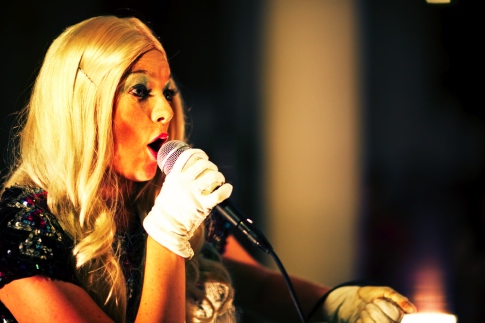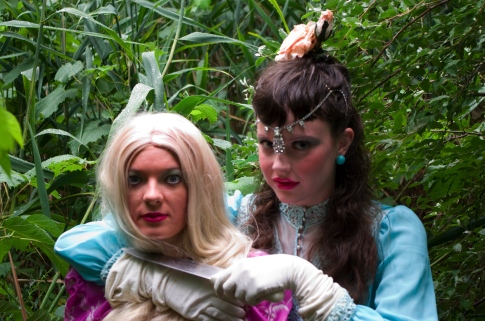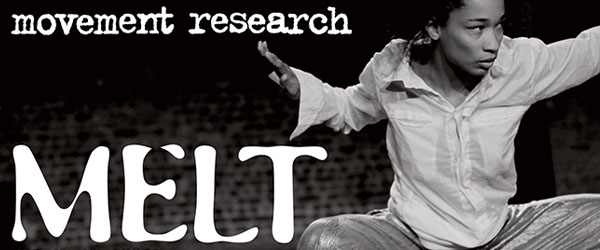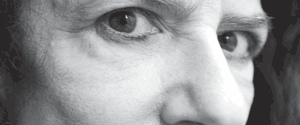Critical Correspondence
- Comments Off on Ann Liv Young in conversation with Christine Elmo
- Conversations
- 5.25.10
Ann Liv Young in conversation with Christine Elmo
Christine Elmo: Let’s talk about Sherry. She seems to do lots of different performances. The other day I was watching Sherry and Naomi. Watching her, I really feel like she has a purpose. With Naomi, she is playing therapist.
Ann Liv Young: For sure
Christine: Preacher, a little bit.
Ann Liv: I made her for many reasons. One, I was pregnant and touring in Amsterdam, and I was really tired of being on my feet so I wanted to make this thing that was stationary. Then I made this radio show and our rehearsal space was really tiny. Basically it fit three people and our table. And that’s how the character [Sherry] started. Then I became more and more interested in ‘How do I actually make this career sustainable?’ I can only build so many sets, tour so many huge productions—for not very much money—for so long. I wanted to make something that was indestructible, that couldn’t be destroyed. I thought, I’m going to have a really loose structure but it’s going to be completely based on the audience. Everything that happens is going to be provoked by the audience. The audience is going to provoke me. And it’s spiraled out of control a little bit, which is great. It is what should happen.
I always say Sherry is the perfect woman. She is so open to so many things. People are always afraid of her, which I think is interesting too. People are always writing “Ann Liv is terrifying”. They mean Sherry. It is usually the Sherry character that I’m doing. They are afraid of her. I mean, certainly my personality is there because I am making it, right? But I don’t necessarily do things in the real show that I would do in real life. I’m a very polite person. I’m very nice. I usually don’t want to upset people. But I grew up with a mother that was hardcore, who was like, “yes ma’am, no ma’am”—people pleaser.
Christine: Southern manners.
Ann Liv: Very southern.
Christine: Your mom is from the south?
Ann Liv: She was hardcore Southern. Everything about the South she replicates. So I grew up knowing that it was important to please people. To make people happy and to make people laugh.
Christine: Sounds infuriating.
Ann Liv: I think I really liked it. I really enjoyed the performative aspects of it. But it kept me from really being able to explore my anger and I think I have a lot of anger because I had a difficult childhood. Everybody has anger.
Christine: How did becoming a mom change the work that you are making?
Ann Liv: I have to stand behind the work more because I feel like I get so much lip, if you will. My daughter affects my work in every aspect. It affects what I make, how I make. I am more aggressive since having Lovey. I’m a little bit more confident because I have to be. If I’m not, people are just going to run all over me. Survival instincts. She is such an awesome kid and she gets a lot of attention for her charisma and the way she looks.
Christine: Can you talk about using your vagina in your work? It’s always there. (Laughs) Our vaginas are always there.
Ann Liv: (Laughs) That’s right.
Christine: The decision to use your vagina in your work; does it come at a specific point in the process?
Ann Liv: No. The process is always different for every piece. I’m not having sex all the time. I have issues surrounding sex. There are things about it that I don’t quite understand. I think that’s what it is.
I’m fascinated by how women should masturbate. Woman should be empowered and not need a man or a woman to satisfy them. They should be able to please themselves. Therapists say it’s so healthy to masturbate. I think that’s their thing and that’s funny to me. What does that mean? You are not taught that at school by any stretch of the imagination. Women are not taught, “you can do this on your own.” Use your own body for your pleasure. I certainly wasn’t. I’m interested in that. And then when you are an adult all of the sudden you are just suppose to know how to please yourself. Nobody teaches you. And all of the sudden you are 30 and people are like, “duh, don’t you masturbate?”
Sherry’s thing is “use what you have in the kitchen.” You don’t have to spend money. She is a Kohl’s woman. Cheap thrills. She is that way because I feel like that is sustainable. Meaning if you just use what you have and you don’t feel like you always have to be reaching outside of yourself, it puts less pressure on everybody. She does stuff with men too but it’s obviously women that she is aiming her thing for.
Christine: Her performances are for women?
Ann Liv: No, for helping women. It’s about empowering the women, the victim who is usually the woman in the case of my shows. But I have stuff for guys too. At my house I did therapy sessions for couples. I don’t know, I think I just have more sympathy towards women.
Christine: Does each piece start with a question or with a series of questions?
Ann Liv: It’s more abstract than that. When I’m making something I’m having about 5000 thoughts jump into my head. I’m influenced by texture and color, like how hot it is during the day and all of those things. How big is the space? How much money am I going to make? Can I afford to pay somebody? Do I want to pay somebody? Is Michael available to watch Lovey? Practical things are the beginning of Sherry things. She was made to enable me to do this as a living. I want to be able to pay my rent with this performance money. I want it to be a sustainable career. The Sherry thing, I usually ask logistic and practical questions. It usually starts with money.
Christine: When does the content come in?
Ann Liv: It’s always there because for me the money is the content. This world revolves around money. This world revolves around people saying, “You can’t make a living being an artist.”
If The Kitchen is not going to give me any more shows because Deb Singer is highly offended by what I make, then how am I going to survive? I’m going to ask that question to the audience because it’s truly a question to me. I know I’m going to be able to survive because I’m resourceful. But I think people should know that those are the types of struggles that this type of work comes up against. It becomes the content.
Christine: How does the performance congeal? You talk about Sherry and being out in front of the audience and her responding to what the audience is doing. How do you rehearse that?
Ann Liv: You don’t. You can’t rehearse that. It’s un-rehearsable.
Christine: So what do you rehearse?
Ann Liv: I don’t. I rehearse music. It’s really incredible because I save so much time because I don’t have to rehearse. I mean I do rehearse lots of singing. I rehearse things like, I have to read my text and then push play at the exact moment so that there isn’t a gap between the text and the music. And then when I come back from being Sherry I have to press this sort of magical wand sound. Little things that make the show run the way I want it to run. It’s a timing issue. I want it to have a certain sort of feeling so that it has that feeling. That’s how it becomes textural for me.
Especially in Cinderella I read a lot of monologues that are suppose to be from Ann Liv’s viewpoint. There are four monologues and I wrote them as me [Ann Liv] but I read them as Cinderella. Meaning they are pretty sincere and honest, but I read them as Cinderella and in the context of Cinderella because I talk about being tired of regurgitating myself. But the reason I do that is because I am by myself all of the time, and Cinderella is by herself all the time. And then I poop onstage and I put the poop back in my butt. Because in articles people will write things like the work is very selfish—it’s self-absorbed—and my response to that is it’s self-absorbed because all I have is myself. I’m the only thing that really inspires me. If people would make more inspiring things then maybe I wouldn’t have to be so self-absorbed. Which is a little bit of an exaggeration.
Christine: Is it a little bit snarky at others?
Ann Liv: It’s not really talking about artists at all; it’s more talking about bloggers and writers. It’s not snarky. You can barely hear it. It’s read as if somebody was coming in to read a cold reading of a monologue and they weren’t that good at being onstage. It’s not talking about other artists. It’s playing on this idea of what people have said about the work and me.
Christine: You are selling your feces, urine and used tampons on your website right now. Are people buying them?
Ann Liv: Yes. They are.
Christine: Who is buying them?
Ann Liv: Europeans, art people, people who are interested in sculpture, people who love the work, and probably some people who are into fetish and a little bit terrifying to me. It wigs me out that people are buying my pooped underwear or my period-stained underwear. Kevin and Michael are like, whatever; they are paying 200 bucks for a pair of your underwear. That’s their response to me saying that, but in some ways I have a hard time with it. In performance I don’t. In performance I’m just like whatever. But when I’m sitting at home and I have this stack of Plexiglas underwear and tampons and pee… Look at all the stuff that people buy. That’s what I am interested in. People might as well be buying each other’s shit because it’s recycling and not destroying the earth. Selling these items comes out of me liking to reuse what is already there. It doesn’t come out of me saying use my shit—it’s worth $200. In some show I may play a character that feels her shit is worth $200. But me myself, I don’t necessarily think that. The website says what to do with the items; put this tampon over your bed at night, it will do this and this and this. The poop is for putting on your kitchen table and it will help with digestion. Or in the bathroom it helps with constipation. Is anybody really going to do that?
Christine: Maybe somebody will. It makes me think of magic and witchcraft. Relics.
Ann Liv: Yes. It’s very similar to magic. Because I sell all of these things on my website, my family is like, “Wow she has really gone downhill. What has happened to her?” That aspect of it, the judgment that comes after, is also quite fascinating to me.
I’m the maker and I can’t get away from myself. It’s the same thing if somebody plays a serial killer. They are not going to be like, since Halle Berry is playing a serial killer she must do these things in real life. I really think because it is live performance people have a really difficult time understanding that it is performance. And it really is performance. I wish I went home and masturbated with a banana. It would probably really help me but I just don’t do that. That doesn’t mean that doing that is bad. I don’t think there is anything wrong with that.
Christine: When you are onstage you are like a force.
Ann Liv: That’s good. I hope so.
Christine: What is your process to getting to this force-like place?
Ann Liv: I think I’m just a good performer. Ever since I was little I liked performing. Being in front of an audience is…. (Pause) It’s so specific to the venue and to the context surrounding all of it.
Christine: Do proscenium architectures versus gallery architectures affect that?
Ann Liv: I’m affected by everything. I take everything into account. I don’t know how that happens. I don’t see it. I’ve been performing for a very long time. The work is the most important thing to me when I am doing it. I’m trying to reach people and to get them to respond and to get people to be present. I don’t know how that happens. I think I like performing. I can just do it. I am really good at working under fire or pressure. If there isn’t pressure I find a way to put pressure on myself.
When I first started making work I got a lot of shit for what I made, how I made it, who I worked with, the way that I worked with people. Especially while in school [Hollins University], [my classmates would say things like] “you can’t sit in front of your performers and yell ‘go!’ It’s not okay.” And I was like fuck you, don’t tell me what is okay. I was simply making what I needed to make. I wasn’t giving people flak but getting the flak. It was really difficult and terrible. These women were in my work but they were also making their own work and that made me so angry—that all of these women were pitted against each other. And I really felt like people were saying that I couldn’t make what I was making or that it wasn’t right. I know people have preached a lot that it should be more democratic and people should be in everyone’s work.
Christine: Who says that?
Ann Liv: Women that I went to Hollins with were very much about democracy.
Christine: How do you feel about how institutions get involved with the marketing and production of peoples work?
Ann Liv: I feel fine about that.
Christine: Even though in the process of institutions working with you on the marketing and production they are telling you what you can and cannot do?
Ann Liv: Nobody has ever told me what I can and cannot do. I am really creative and flexible and I know how to work with people regardless of what people say. In Europe venues are not The Kitchen, they are not DTW. They’ve booked you. They are giving you a certain amount of work and they have booked you because they have given you a certain amount of work. Europe doesn’t hassle me and that’s why I prefer European venues versus New York.
Christine: Do you feel like the US is more conservative than Europe?
Ann Liv: I just feel like Europe understands it’s fucking theater. It’s theater! And people here are like, Why are you yelling at him? And I am like, I’m doing a play. I don’t understand it.
Christine: There is less questioning in Europe?
Ann Liv: Nobody questions me ever. Here, all the time. I recently performed in Sweden and there was poop on the stage. The head curator came up to me the next day and she said, “The show was amazing. I cleaned up your poop last night.” And I said, “Oh my God. I am really sorry I totally would have cleaned it up.” And she said, “No, it’s our job. It was actually kind of wonderful.” I mean, Europeans have a totally different mindset about art. For them it’s such a crucial part of the way that they live. For us, our weekly trip to Target is equivalent.
Christine: Performance work needs community. It needs audience.
Ann Liv: Does it?
Christine: Where are you in community? And I’m not talking about the dance community because you have strong feelings about the dance community, but in any community. When you present something you are presenting it somewhere. Where are you putting it? And where do you see yourself in that place that you are putting it?
Ann Liv: I don’t know. I don’t see myself putting it in any particular place. I know that when I go to Europe, they market it as performance art and when I’m in the US they market it as performance or choreography or a play. I don’t know the answer to that. I don’t really think about that. I just think about making the work. And I think about the marketing that surrounds it. How do I want to market it? Where do I want the work to go even though a lot of times I don’t have control over that.
Christine: Where do you want it to go?
Ann Liv: I think I just want more people to see it.
Christine: Do you have a selective audience?
Ann Liv: No! I don’t have a selective audience at all. I would never think about it like that unless it was something like, this is a show for men only, which I’ve thought about doing. At this point I would like for everyone to see it. I might advise a child not to see it. Not because of the sexual aspects but because of the violence.
I want to do my work in all different types of venues. It’s not like I just want to show my work in a gallery and I only want a visual art audience. I think that is total bullshit. I want to do stuff in galleries, in theaters, in music venues. We are in the process of getting a truck—the Sherry truck—and we are going to do performances throughout NYC in this truck. I’m not selective in that way. Because I feel like it is important for me to do what the work wants to do too. And sometimes you don’t know what that is until you are there.
I don’t see myself in a certain way. I’m just trying to survive and raise my kid and keep making this work. I’m a nice person. I’m more than happy to talk with people and be people’s friends. It gets difficult because the work is controversial. I am friendly with people who are not in performance at all. A lot of our friends in Europe have kids and make performance work. It feels like one of those relationships where no matter what these people are going to love me, whereas in the U.S. I am on pins and needles and hope people don’t remove me as their friend on Facebook.





